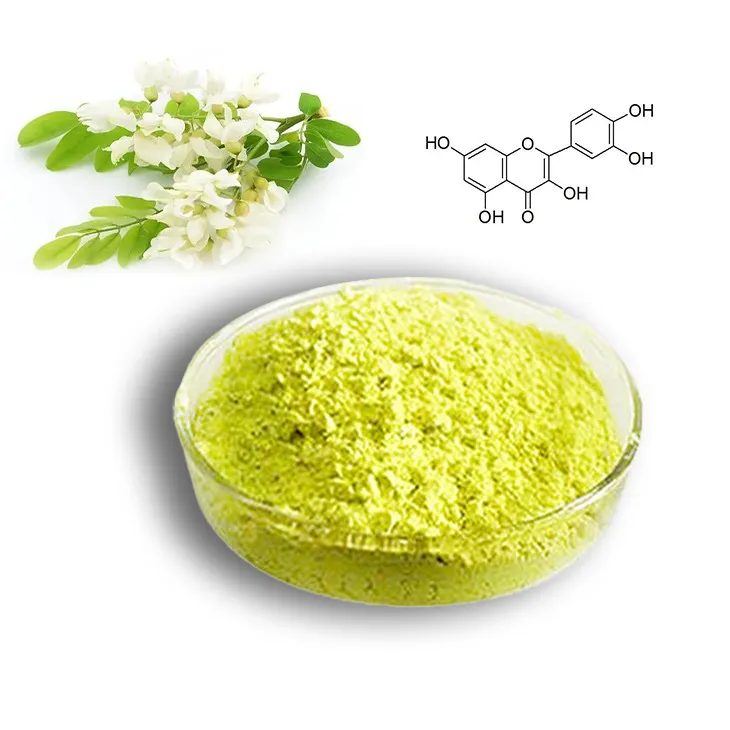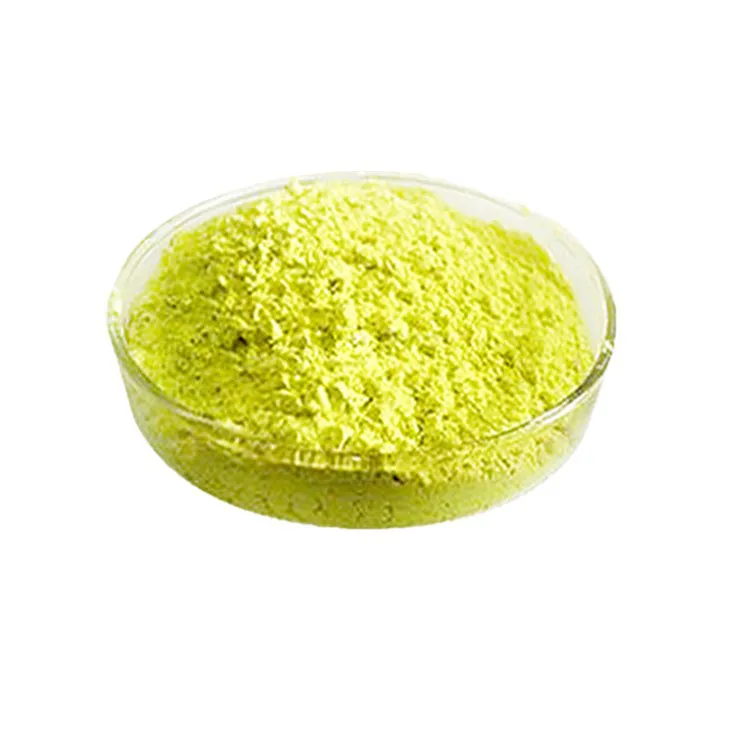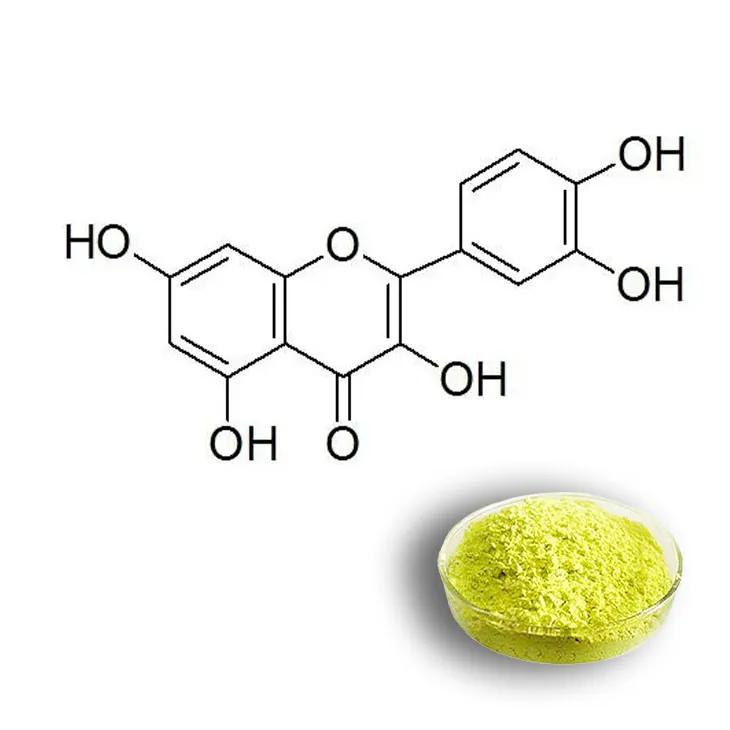- 0086-571-85302990
- sales@greenskybio.com
14 Major Health - care Effects of Quercetin.
2024-11-13

1. Introduction to Quercetin
Quercetin is a natural flavonoid that is widely present in various plants such as onions, apples, and berries. It has been the subject of extensive research due to its numerous potential health - care effects. This flavonoid is known for its diverse biological activities, which make it a promising compound in the field of health and medicine.

2. Antioxidant Properties
Quercetin is a powerful antioxidant. Free radicals are highly reactive molecules that can cause damage to cells, proteins, and DNA in the body. These free radicals are generated through normal metabolic processes as well as exposure to environmental factors like pollution, radiation, and certain chemicals. Quercetin's antioxidant activity helps combat these free radicals.
It donates electrons to free radicals, thereby neutralizing them and preventing them from causing oxidative stress. Oxidative stress has been linked to a wide range of diseases, including heart disease, cancer, and neurodegenerative disorders. By reducing oxidative stress, quercetin may play a role in preventing or delaying the onset of these diseases.

3. Anti - inflammatory Effects
Quercetin also exhibits significant anti - inflammatory properties. Inflammation is a natural response of the body to injury or infection. However, chronic inflammation can lead to various diseases such as arthritis, inflammatory bowel disease, and even some types of cancer.
Quercetin works by inhibiting the production of inflammatory mediators such as cytokines and prostaglandins. These mediators are responsible for promoting the inflammatory response. By reducing their production, quercetin can help to alleviate inflammation - related diseases.
Studies have shown that quercetin can be effective in reducing inflammation in animal models and in vitro studies. For example, in arthritis models, quercetin has been shown to reduce joint swelling and pain.

4. Heart Health
Quercetin has multiple benefits for heart health. One of the key ways it supports heart health is by improving blood vessel function. It helps to relax the smooth muscles in the blood vessels, which in turn improves blood flow. This can reduce blood pressure, as high blood pressure is a major risk factor for heart disease.
Another important aspect is its effect on cholesterol levels. Quercetin may help to lower LDL (low - density lipoprotein) cholesterol, also known as "bad" cholesterol, while increasing HDL (high - density lipoprotein) cholesterol, or "good" cholesterol. This favorable change in the lipid profile can reduce the risk of atherosclerosis, a condition in which plaque builds up in the arteries and restricts blood flow.
Furthermore, quercetin's antioxidant and anti - inflammatory properties also contribute to heart health. By reducing oxidative stress and inflammation in the blood vessels and heart tissue, it can help prevent damage to the heart and blood vessels.

5. Immune System Enhancement
Quercetin has the potential to enhance the immune system. It can modulate the function of immune cells such as lymphocytes, macrophages, and dendritic cells.
For example, it can stimulate the production of cytokines that are involved in the immune response. At the same time, it can also help to regulate the immune response to prevent over - activation, which can lead to autoimmune diseases.
In addition, quercetin may have antiviral properties. Some studies have suggested that it can inhibit the replication of certain viruses, such as influenza virus. This makes it a potentially useful compound for preventing and treating viral infections.
6. Cancer - Preventive Potential
Quercetin shows promise in cancer prevention. Its antioxidant and anti - inflammatory properties play a role in this regard. Oxidative stress and chronic inflammation are two factors that can contribute to the development of cancer.
Quercetin can also directly interact with cancer cells. It may induce apoptosis (programmed cell death) in cancer cells, which is a natural mechanism for eliminating abnormal cells. Additionally, it can inhibit the growth and proliferation of cancer cells by interfering with cell cycle regulation.
Studies have been conducted on various types of cancer, including breast cancer, prostate cancer, and colon cancer. While more research is needed, the results so far suggest that quercetin may be a valuable compound in cancer prevention strategies.
7. Respiratory Health
Quercetin can improve respiratory health. It has been shown to have anti - allergic properties, which can be beneficial for people with asthma and other allergic respiratory diseases.
Quercetin can inhibit the release of histamine from mast cells. Histamine is a key mediator in allergic reactions, causing symptoms such as sneezing, itching, and wheezing. By reducing histamine release, quercetin can help to relieve these symptoms.
Moreover, quercetin may also have anti - infective properties in the respiratory tract. It can help the body fight off respiratory infections such as the common cold and pneumonia.
8. Anti - Diabetic Effects
Quercetin may have anti - diabetic effects. It can improve insulin sensitivity, which is important for regulating blood sugar levels. In people with diabetes, the body's cells become resistant to insulin, leading to high blood sugar levels.
Quercetin can also help to regulate glucose metabolism in the liver. It may inhibit the production of glucose in the liver, which can further contribute to better blood sugar control.
Studies in animal models of diabetes have shown promising results, but more research is needed to determine its effectiveness in humans.
9. Neuroprotective Properties
Quercetin has neuroprotective properties. The brain is highly vulnerable to oxidative stress and inflammation, which can lead to neurodegenerative diseases such as Alzheimer's and Parkinson's disease.
Quercetin's antioxidant and anti - inflammatory effects can help protect brain cells from damage. It may also enhance the function of the blood - brain barrier, which is a protective barrier that prevents harmful substances from entering the brain.
Some studies have shown that quercetin can improve cognitive function in animal models, but more research is needed to explore its potential in humans.
10. Anti - Aging Effects
Quercetin may have anti - aging effects. The oxidative stress and inflammation that occur over time can contribute to the aging process. By reducing oxidative stress and inflammation, quercetin can potentially slow down the aging process.
It may also affect cellular senescence, which is a state in which cells stop dividing and start to deteriorate. By modulating cellular senescence, quercetin could help to maintain the health and function of cells as we age.
11. Skin Health
Quercetin can benefit skin health. Its antioxidant properties can protect the skin from damage caused by ultraviolet (UV) radiation, pollution, and other environmental factors.
Quercetin can also help to reduce inflammation in the skin, which is beneficial for conditions such as acne, eczema, and psoriasis. Additionally, it may stimulate collagen production, which can improve skin elasticity and reduce the appearance of wrinkles.
12. Gut Health
Quercetin has a positive impact on gut health. It can act as a prebiotic, promoting the growth of beneficial gut bacteria such as bifidobacteria and lactobacilli.
These beneficial bacteria play important roles in digestion, immune function, and overall health. By promoting their growth, quercetin can help to maintain a healthy gut microbiota.
Quercetin may also have anti - infective properties in the gut, helping to prevent and treat gut infections.
13. Anti - Fatigue Effects
Quercetin may have anti - fatigue effects. It can improve mitochondrial function, which is responsible for producing energy in cells.
By enhancing mitochondrial function, quercetin can increase energy production, which may help to reduce fatigue and improve physical performance.
Some studies in athletes have shown that quercetin supplementation can improve endurance and reduce muscle fatigue.
14. Conclusion
Quercetin is a natural compound with a wide range of potential health - care effects. From its antioxidant and anti - inflammatory properties to its effects on various organ systems such as the heart, immune system, and cancer prevention, it shows great promise in promoting health and preventing disease.
However, more research is needed to fully understand its mechanisms of action and to determine the optimal dosage and forms for supplementation. Overall, quercetin is an exciting area of research in the field of natural health products.
FAQ:
What are the antioxidant mechanisms of quercetin?
Quercetin has antioxidant properties mainly because it can directly scavenge free radicals. Free radicals are unstable molecules that can cause oxidative damage to cells. Quercetin donates electrons to these free radicals, making them more stable and thus reducing the oxidative stress on the body.
How does quercetin reduce cholesterol levels?
Quercetin may reduce cholesterol levels through multiple pathways. It can interfere with the absorption of cholesterol in the intestine, and also affect the metabolism of cholesterol in the liver. By these means, it helps to lower the overall cholesterol levels in the body.
Can quercetin prevent all types of cancers?
No, quercetin cannot prevent all types of cancers. However, it shows potential in protecting against certain cancers. It may work by inhibiting the growth of cancer cells, inducing apoptosis (programmed cell death) in cancer cells, and interfering with the signaling pathways related to cancer development.
What is the role of quercetin in respiratory health?
Quercetin can play a positive role in respiratory health. It has anti - inflammatory effects in the respiratory system, which can help reduce inflammation in the airways. It may also enhance the immune response in the respiratory tract, helping to defend against respiratory infections.
How does quercetin enhance the immune system?
Quercetin enhances the immune system in several ways. It can stimulate the activity of immune cells such as macrophages and lymphocytes. It also helps regulate the immune response, ensuring that the immune system functions properly and can effectively respond to pathogens.
Related literature
- Quercetin: A Promising Molecule for Health Benefits"
- "The Multifaceted Health Effects of Quercetin: A Review"
- "Quercetin and Its Role in Preventing Chronic Diseases"
- ▶ Hesperidin
- ▶ Citrus Bioflavonoids
- ▶ Plant Extract
- ▶ lycopene
- ▶ Diosmin
- ▶ Grape seed extract
- ▶ Sea buckthorn Juice Powder
- ▶ Fruit Juice Powder
- ▶ Hops Extract
- ▶ Artichoke Extract
- ▶ Mushroom extract
- ▶ Astaxanthin
- ▶ Green Tea Extract
- ▶ Curcumin
- ▶ Horse Chestnut Extract
- ▶ Other Product
- ▶ Boswellia Serrata Extract
- ▶ Resveratrol
- ▶ Marigold Extract
- ▶ Grape Leaf Extract
- ▶ New Product
- ▶ Aminolevulinic acid
- ▶ Cranberry Extract
- ▶ Red Yeast Rice
- ▶ Red Wine Extract
-
Angelica sinensis extract
2024-11-13
-
Pine bark Extract Powder
2024-11-13
-
Selenium yeast
2024-11-13
-
Clove Powder
2024-11-13
-
Carrageenan Extract Powder
2024-11-13
-
Thunder God Vine Extract
2024-11-13
-
Red Date Extract
2024-11-13
-
Buckthorn bark extract
2024-11-13
-
Hops Extract
2024-11-13
-
Nutmeg Extract
2024-11-13





















